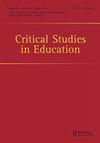The timescape of school tasks: towards algorhythmic patterns of on-screen tasks
IF 2.7
2区 教育学
Q1 EDUCATION & EDUCATIONAL RESEARCH
引用次数: 1
Abstract
ABSTRACT Screens are becoming omnipresent surfaces inside classrooms, namely through the implementation of personal screens at schools. This implementation reconfigures spatiotemporal organization of lesson activities by introducing specific screen mediated tasks that are majorly conducted individually on screens. By adopting the notion of timescape as an analytical lens to investigate the temporal landscape of screen mediated tasks, we turn our attention to students’ screen as the site in which different activities take place. By conducting an online guided tour with students in different subject matters, combined with an ethnographic observation, we firstly investigate how specific type of activities take shape on the screen during the task time and produce an internal temporality of screen. Secondly, through the analysis of the chronological time, we describe different temporal zones of synchronicity, focalization and dispersal. Finally, we argue that rhythms of screen mediated tasks are better captured through the term ‘algorhythm’ and conclude how algorhythmic patterns of task time enhance the prioritization of task completion instead of task duration which is a significant characteristic of the produced taskified time.学校任务的时间跨度:屏幕任务的算法节奏模式
屏幕正在成为教室内无所不在的表面,即通过在学校实施个人屏幕。通过引入主要在屏幕上单独执行的特定屏幕介导任务,该实现重新配置了课程活动的时空组织。通过采用时间逃逸的概念作为分析镜头来研究屏幕介导任务的时间景观,我们将注意力转向学生的屏幕作为不同活动发生的场所。通过与不同主题的学生进行在线导览,结合民族志观察,我们首先研究了特定类型的活动在任务时间内如何在屏幕上形成,并产生屏幕的内部时间性。其次,通过对时间顺序的分析,描述了同步性、集中性和分散性的不同时间区。最后,我们认为通过“算法节奏”一词可以更好地捕捉屏幕介导任务的节奏,并得出任务时间的算法节奏模式如何增强任务完成的优先级,而不是任务持续时间,这是产生的任务化时间的一个重要特征。
本文章由计算机程序翻译,如有差异,请以英文原文为准。
求助全文
约1分钟内获得全文
求助全文
来源期刊

Critical Studies in Education
EDUCATION & EDUCATIONAL RESEARCH-
CiteScore
10.10
自引率
5.10%
发文量
18
期刊介绍:
Critical Studies in Education is one of the few international journals devoted to a critical sociology of education, although it welcomes submissions with a critical stance that draw on other disciplines (e.g. philosophy, social geography, history) in order to understand ''the social''. Two interests frame the journal’s critical approach to research: (1) who benefits (and who does not) from current and historical social arrangements in education and, (2) from the standpoint of the least advantaged, what can be done about inequitable arrangements. Informed by this approach, articles published in the journal draw on post-structural, feminist, postcolonial and other critical orientations to critique education systems and to identify alternatives for education policy, practice and research.
 求助内容:
求助内容: 应助结果提醒方式:
应助结果提醒方式:


